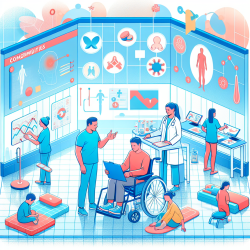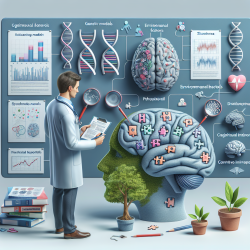Introduction
As a speech-language pathologist, understanding the role of nutrients like Docosahexaenoic Acid (DHA) in brain development can significantly enhance the outcomes of your therapeutic interventions. DHA, a long-chain polyunsaturated fatty acid, is a critical structural component of the brain, accumulating rapidly during the last trimester of pregnancy and continuing at high rates until two years of age. This blog explores the implications of the research article "DHA Effects in Brain Development and Function" and how it can inform your practice.
The Importance of DHA in Early Development
Research highlights that DHA is essential for optimal brain development and function. Its accumulation in the brain is crucial during the fetal stage and early childhood, influencing neuronal growth and signaling. Human studies predominantly focus on DHA's contribution to visual acuity development, but emerging data suggest its broader impact on cognitive and psychiatric health.
Gender and Genetic Influences
Interestingly, the effects of DHA are not uniform across all individuals. Recent studies indicate that gender and genetic factors, particularly polymorphisms in the fatty acid desaturase (FADS) gene cluster, can influence DHA synthesis and its effects on the brain. This variability underscores the need for personalized approaches in nutritional recommendations and therapeutic interventions.
Implementing DHA Knowledge in Practice
As practitioners, integrating DHA-related insights can enhance therapy outcomes. Here are some actionable steps:
- Dietary Recommendations: Encourage parents to include DHA-rich foods, such as fish and DHA-fortified products, in their children's diets, especially during critical developmental windows.
- Collaborative Care: Work with nutritionists to develop comprehensive care plans that address dietary needs alongside therapeutic goals.
- Genetic Considerations: Be aware of genetic differences that may affect DHA metabolism and consider these when discussing dietary strategies with families.
Encouraging Further Research
The current body of research provides a strong foundation, but more studies are needed to fully understand DHA's role across different populations and developmental stages. As practitioners, staying informed about new research and advocating for further studies can help refine therapeutic practices and improve outcomes for children.
Conclusion
DHA plays a pivotal role in brain development, with significant implications for cognitive and visual functions. By incorporating these insights into practice, speech-language pathologists can better support children's developmental needs. To delve deeper into the research, I encourage you to read the original paper: DHA Effects in Brain Development and Function.










